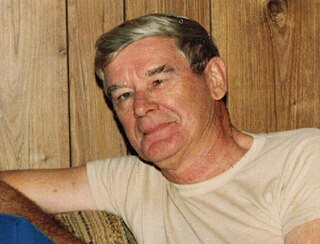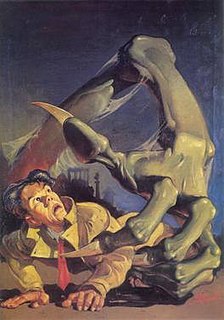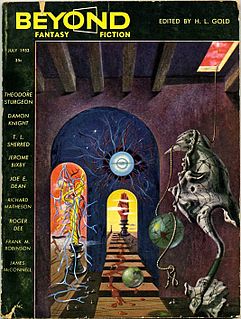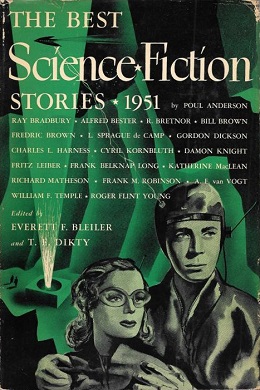Related Research Articles

James Benjamin Blish was an American science fiction and fantasy writer. He is best known for his Cities in Flight novels, and his series of Star Trek novelizations written with his wife, J. A. Lawrence. He is credited with creating the term "gas giant" to refer to large planetary bodies.
Reginald Bretnor was an American science fiction author who flourished between the 1950s and 1980s. Most of his fiction was in short story form, and usually featured a whimsical story line or ironic plot twist. He also wrote on military theory and public affairs, and edited some of the earliest books to consider SF from a literary theory and criticism perspective.
Gordon Rupert Dickson was a Canadian-American science fiction writer. He was inducted into the Science Fiction and Fantasy Hall of Fame in 2000.

The Magazine of Fantasy & Science Fiction is a U.S. fantasy and science fiction magazine first published in 1949 by Fantasy House, a subsidiary of Lawrence Spivak's Mercury Press. Editors Anthony Boucher and J. Francis McComas had approached Spivak in the mid-1940s about creating a fantasy companion to Spivak's existing mystery title, Ellery Queen's Mystery Magazine. The first issue was titled The Magazine of Fantasy, but the decision was quickly made to include science fiction as well as fantasy, and the title was changed correspondingly with the second issue. F&SF was quite different in presentation from the existing science fiction magazines of the day, most of which were in pulp format: it had no interior illustrations, no letter column, and text in a single column format, which in the opinion of science fiction historian Mike Ashley "set F&SF apart, giving it the air and authority of a superior magazine".

John Frederick Clute is a Canadian-born author and critic specializing in science fiction and fantasy literature who has lived in both England and the United States since 1969. He has been described as "an integral part of science fiction's history" and "perhaps the foremost reader-critic of sf in our time, and one of the best the genre has ever known." He was one of eight people who founded the English magazine Interzone in 1982.

The Hugo Award for Best Professional Editor is one of the Hugo Awards given each year for science fiction or fantasy stories published or translated into English during the previous calendar year. The award is available for editors of magazines, novels, anthologies, or other works related to science fiction or fantasy. The award supplanted a previous award for professional magazine. The Hugo Awards have been described as "a fine showcase for speculative fiction" and "the best known literary award for science fiction writing".
Edward Lewis Ferman was an American science fiction and fantasy editor and magazine publisher, known best as the editor of The Magazine of Fantasy and Science Fiction (F&SF).

Arthur Wilson "Bob" Tucker was an American theater technician who became well known as a writer of mystery, action adventure, and science fiction under the name Wilson Tucker.

Edward Daniel Cartier, known professionally as Edd Cartier, was an American pulp magazine illustrator who specialized in science fiction and fantasy art.

The Encyclopedia of Fantasy is a 1997 reference work concerning fantasy fiction, edited by John Clute and John Grant. Other contributors include Mike Ashley, Neil Gaiman, Diana Wynne Jones, David Langford, Sam J. Lundwall, Michael Scott Rohan, Brian Stableford and Lisa Tuttle.

Infinity Science Fiction was an American science fiction magazine, edited by Larry T. Shaw, and published by Royal Publications. The first issue, which appeared in November 1955, included Arthur C. Clarke's "The Star", a story about a planet destroyed by a nova that turns out to have been the Star of Bethlehem; it won the Hugo Award for that year. Shaw obtained stories from some of the leading writers of the day, including Brian Aldiss, Isaac Asimov, and Robert Sheckley, but the material was of variable quality. In 1958 Irwin Stein, the owner of Royal Publications, decided to shut down Infinity; the last issue was dated November 1958.
Phyllis Eisenstein is an American author of science fiction and fantasy short stories and novels whose work has been nominated for both the Hugo Award and Nebula Award.

Science-Fiction Handbook, subtitled The Writing of Imaginative Fiction, is a guide to writing and marketing science fiction and fantasy by L. Sprague de Camp, "one of the earliest books about modern sf." The original edition was published in hardcover by Hermitage House in 1953 as a volume in its Professional Writers Library series. A revised edition, by L. Sprague de Camp and Catherine Crook de Camp, titled Science Fiction Handbook, Revised, was published in hardcover by Owlswick Press in 1975 and as a trade paperback by McGraw-Hill in 1977. An E-book version of the revised edition was published by Gollancz's SF Gateway imprint on April 30, 2014.

Beyond Fantasy Fiction was a US fantasy fiction magazine edited by H. L. Gold, with only ten issues published from 1953 to 1955. The last two issues carried the cover title of Beyond Fiction, but the publication's name for copyright purposes remained as before.

The Best Science Fiction Stories: 1951 is a 1951 anthology of science fiction short stories edited by Everett F. Bleiler and T. E. Dikty. An abridged edition was published in the UK by Grayson in 1952 under the title The Best Science Fiction Stories: Second Series. Most of the stories had originally appeared in 1950 in the magazines Fantasy and Science Fiction, Worlds Beyond, Astounding SF, Other Worlds, Galaxy Science Fiction, Fantastic Story Quarterly, Startling Stories, Collier's Weekly, Thrilling Wonder Stories and Weird Tales.
"Exhalation" is a science fiction short story by American writer Ted Chiang, about the Second Law of Thermodynamics. It was first published in 2008 in the anthology Eclipse 2: New Science Fiction and Fantasy, edited by Jonathan Strahan. In 2019, the story was included in the collection of short stories Exhalation: Stories.

The Hugo Award is an annual literary award for the best science fiction or fantasy works and achievements of the previous year, given at the World Science Fiction Convention and chosen by its members. The Hugo is widely considered the premier award in science fiction. The award is administered by the World Science Fiction Society. It is named after Hugo Gernsback, the founder of the pioneering science fiction magazine Amazing Stories. Hugos were first given in 1953, at the 11th World Science Fiction Convention, and have been awarded every year since 1955.
"The Man Who Lost the Sea" is a science fiction short story by American writer Theodore Sturgeon. Originally published in the October 1959 issue of The Magazine of Fantasy and Science Fiction, it was nominated for the 1960 Hugo Award for Best Short Fiction.

The Science Fiction Bestiary is an anthology of science fiction novelettes and short stories edited by Robert Silverberg. It was first published in hardcover by Thomas Nelson in 1971; it was reprinted in March 1973. The first paperback edition was published by Dell Laurel in February 1974. It has also been translated into German.
"Catch That Zeppelin!" is a 1975 alternate history short story by American writer Fritz Leiber. It was first published in The Magazine of Fantasy and Science Fiction.
References
- ↑ 1951 Retro-Hugo Awards, at TheHugoAwards.org; retrieved January 8, 2020
- ↑ "Bretnor, Reginald", in the Encyclopedia of Science Fiction , by John Clute; version published August 31, 2018; retrieved January 8, 2020